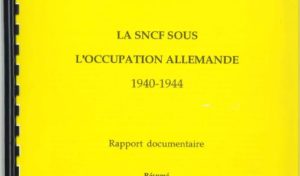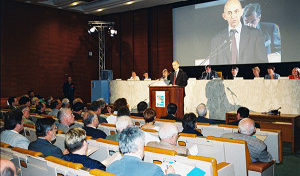Commissioning historical research
After gathering together our historical archives and making them available to the public, we found that our wartime records were incomplete. So, we commissioned independent research to learn more about this complex period in our history. Expert historians dug into the evidence and published their findings, which were debated at a symposium held at France’s National Assembly. We’ve also partnered with universities, research institutes, and museums. And we’ve contributed to historical works.
1996: The Bachelier Report
In the early 1990s, then-SNCF Chairman Jacques Fournier decided it was time to take a fresh, objective, evidence-based look at the company’s past—in part because knowledge in certain areas was lacking, but also because of controversy surrounding the role of French railways in Nazi deportations. In November 1992, we signed a research agreement with the Institute of History of Present Time (IHTP), a unit of the French National Centre for Scientific Research (CNRS), to conduct in-depth research into SNCF’s history during the Second World War.
Historian Christian Bachelier led the study, working under fellow historian and IHTP director Henry Rousso. His findings were delivered in September 1996 in a report entitled The SNCF Under German Occupation: 1940–1944.
Known informally as the Bachelier Report, the account traces the history of the state-owned company at a time when it was controlled by both the Vichy government and the German occupying forces. It details how equipment was requisitioned by force, how German railway officials controlled SNCF employees and supervised railway operations, and how Nazi officials organized and implemented the deportations. The report also looks at the role of French rail workers in this process—and at the reprisals they faced for supporting the Resistance. The final few chapters cover the liberation, the ensuing legal purge, and the rebuilding of France in the post-war years.
Learn more:
The Bachelier Report is a 900-page document in two volumes, accompanied by two additional volumes of appendices containing sources from the SNCF archives, and the French and German national archives. Appendix 1 features general archive materials, while Appendix 2 contains sources relating specifically to the deportations.
An unabridged copy of the report is available (in French) on the SNCF website.
2000: Symposium on SNCF 1939–1945
At the initiative of then-SNCF Chairman Louis Gallois, the French Railway Historical Society (AHICF) organized a symposium entitled “A state-owned enterprise in wartime: SNCF 1939–1945”. The event, held at the French National Assembly on June 20–21, 2000, built on many years of research into SNCF’s history, including the flagship Bachelier Report completed in 1996.
Coordinated by an independent steering committee, the symposium was chaired by historian René Rémond, President of the French National Foundation of Political Science. It was attended by a number of well-known researchers including Laurent Douzou, Serge Klarsfeld, Michel Margairaz, Eugène Riedweg, Henry Rousso and Serge Wolikow, as well as by Philippe Bélaval, who at the time served as Director of the French National Archives. Curators at the National Archives also compiled an inventory of sources. Speakers were SNCF executives, rail workers and other witnesses with personal experience of the Second World War.
As one of the first events of its kind in France devoted to a major state-owned company during the Second World War, the symposium drew on insights from corporate, public-sector, social and wartime history. The presentations and debates covered a range of topics—from the availability of archive materials, to key issues such as SNCF’s strategy, the imperatives of the war economy, and the deportation of Jews from France. Attendees also learned what the Second World War and the German Occupation meant for rail workers, and how they contributed to the Resistance.
The proceedings (in French) were published by Presses Universitaires de France in 2001, under the title Une entreprise publique dans la guerre : la SNCF, 1939–1945 (A state-owned enterprise in wartime: SNCF 1939–1945), as well as on the website of the French Railway Historical Society (AHICF)
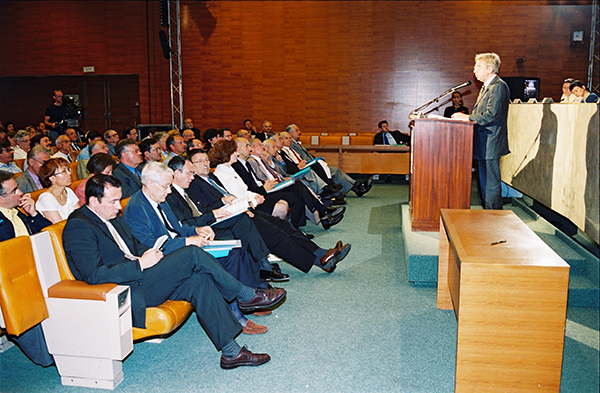
SNCF appeals for first-hand accounts
With the Second World War rapidly fading into the past, SNCF turned to the rail community to preserve memories of the period and to expand the historical resources available to researchers and society at large. Throughout 2012, we appealed to rail workers to contribute first-hand accounts. Hundreds of people responded with personal documents, photographs, objects, and written accounts, which were collected and preserved the SNCF Archives and Documentation Service (SARDO). In addition, over 200 sources agreed to be interviewed by the French Railway Historical Society (AHICF).
A selection of these interviews, entitled “Daily life and work during the Second World War: Rail workers’ stories and reminiscences”, is available on the Mémoire orale de l’industrie et des réseaux website (in French).
The exercise was a joint endeavor with AHICF, which SNCF has called on to handle projects on the history and commemoration of the Second World War on several occasions. SNCF is a founding member of the society, which was formed in 1987 to bring rail professionals together with researchers in the humanities and social sciences. Its activities—research, documentation, publishing, exhibitions, and consulting—are supervised by an independent coordinating committee.
Learn more on the AHICF website (in French)
In 2015, the National Archives hosted Voix cheminotes: An oral history of rail workers from 1930 to 1950, an audio exhibition curated by AHICF and featuring excerpts from the witness accounts gathered following SNCF’s appeal.
Click here for a virtual visual and audio tour of the exhibition on the National Archives website (in French).
Commemorating rail workers killed under the German occupation
In April 2017, SNCF and the French Railway Historical Society (AHICF) released Cheminots victimes de la répression, 1940–1945 (Rail workers killed under the German occupation, 1940–1945, Paris, Perrin, 2017). This 1,764-page commemorative book, published by Perrin, pays tribute to the rail workers—all current or former SNCF employees at the time—who died at the hands of the Nazis and the Vichy government.
The main body of the work focuses on the 2,229 individuals who were executed on account of their alleged or proven involvement in the Resistance—people who died in prison in France, who faced summary execution, who were taken hostage and murdered, and who lost their lives after being deported to Germany, or upon their return to France. It does not include others who lost their lives during the war, such as those killed in aerial bombings and machine-gun attacks, and military personnel who died on active duty in 1939–1940. Part two, meanwhile, profiles a further 443 lives lost during the battle for the liberation of France, many of whom were members of Maquis Resistance cells.
Between 2012 and 2016, researchers delved into archive materials—most never studied before, or at least not together—to compile 2,672 original and updated biographies. Over 3,500 other sets of records were examined, but these individuals were excluded from the book because the team was unable to verify that they worked as for the railways or confirm that they were killed on account of their involvement in the Resistance.
The book, which opens with a 55-page introduction giving background and contextual information and includes a list of sources, a glossary, and a selective bibliography, also serves as an authoritative academic work and an important educational resource.
Bringing home history through personal stories
Modern-day historians have come to recognize that personal stories can provide compelling insights into our shared history—which is why academics, organizations, and even local authorities have published “commemorative books.” Notable examples include historian Serge Klarsfeld (on French Jews), the Fondation pour la Mémoire de la Déportation (on political deportees and Resistance members), and the Order of the Liberation (on recipients of the honor). The SNCF and AHICF volume, as the first of its kind to examine the Second World War from the perspective of a particular professional community, is very much in keeping with this trend.
Working with experts
Compiling the book was a collaborative effort. The project was coordinated by AHICF and overseen by a committee including the SNCF Archives and Documentation Service (SARDO), the French Rail Workers Genealogical Society, the Institute of Social History of the French Rail Workers’ Federation, ANCAC (the French association for rail worker veterans, war victims, and war widows), La Coupole war museum, two non-profit organizations (Rail & Mémoire and Mémoire Vive), the History Department of the French Ministry of Defence, and several leading academics.
The text was written by 39 authors in total—all working under historian Thomas Fontaine, all experts in the crackdown on Resistance members under the German Occupation, and all with a record of publishing local monographs or contributing to biographical dictionaries.
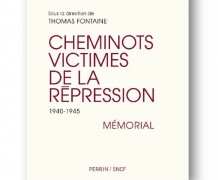
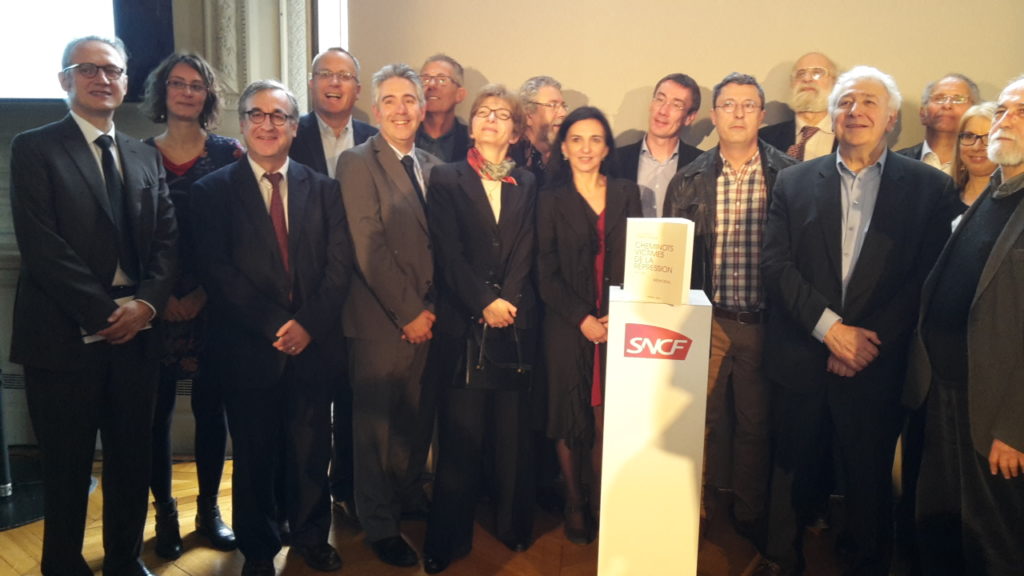
Learn more about French rail workers and the Resistance

